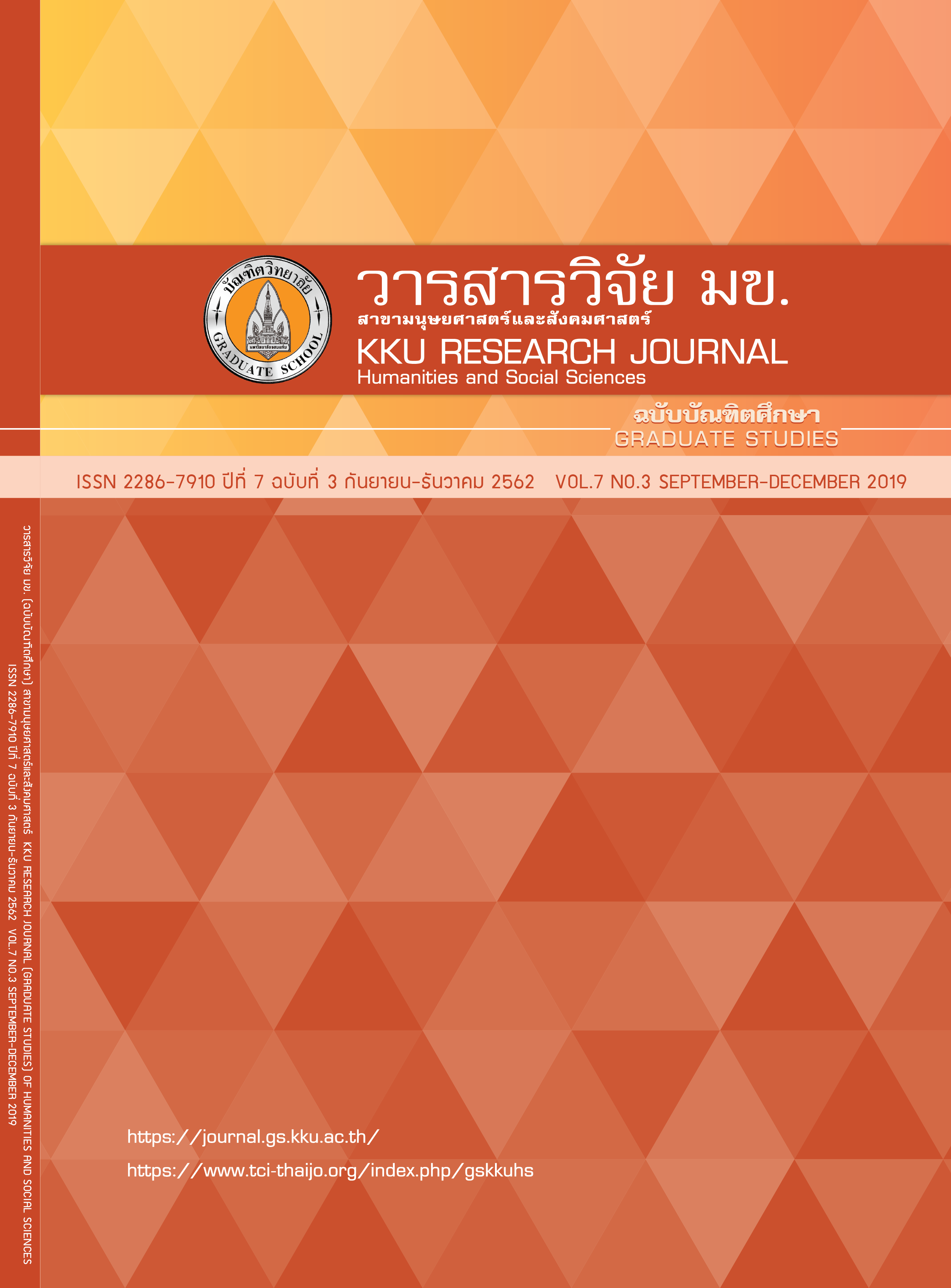A Study of Learning Achievement on Biomolecule Learning Unit Problems Solving Ability and Scientific Mind of Grade 10 Students Using Problem-Based Learning
Keywords:
Problem based learning, Problem solving ability, Scientific mindAbstract
This research aimed to 1) compare learning achievement on Biomolecule learning unit of students, 2) compare problem solving ability, 3) compare scientific mind before and after learning unit and 4) compare learning achievement on Biomolecule learning unit of students using problem based learning between after learning and the 70 percent criterion. The sample group was grade 10 students in the second academic year of 2017 at Mattayomdankhontod School. There were 35 students and selected using cluster random sampling. The study tools were lesson plans with problem based learning, achievement test on Biomolecule learning unit, problem solving ability test and scientific mind questionnaires. The findings for this research were as follows: a comparison of learning achievement, problem solving ability and scientific mind before and after learning management was found that after learning was higher than before learning management at the .05 level, and after the learning achievement of learning unit on Biomolecule was higher than the 70 percent criterion with statistical significance at the .05 level.
References
Students While Vietnam scores better than Thailand on all sides [Internet]. Bangkok:
Thaitribune Report; 2016. [cited 2018 Feb 4]. Available from: http://www.thaitribune.org.go.th
2. Chai Chai Yuen. Interpretive Research: A paradigm for scientific research. [Research papers].
Khon Kaen: Khon Kaen University; 2006. Thai.
3. The institute for the Promotion of Teaching Science and Technology. Manual to Measurement
and evaluation of science. Bangkok: The institute for the Promotion of Teaching Science and
Technology; 2002. Thai
4. Sukont Sinsupanond. Instructional Design for Improving Quality of Youth. 3rd ed
St. Bangkok: 9119 Printing Technique; 2009. Thai
5. Pun Thongchumnum. Elementary Science Teaching. Bangkok: Odean Store;
2004. Thai
6. Hmelo, C.E. and Lin, X. Becoming self-directed learners: Strategy development in
problem-based learning. Mahwah, NJ: Erlbaum; 2000.
7. Weir, J.J. Problem Solving Every body’s Problem, The Science Teacher. 1974;
(4 April): 16-18
8. The institute for the Promotion of Teaching Science and Technology. Measurement
and evaluation of science. Bangkok: SE–EDUCATION Public Company Limited;
2012. Thai
9. Paisan Woracham. Educational Research. 7th ed St. Mahasarakam: Taksila
Printing; 2015. Thai
10. Somboon Tanya. Educational research methodology. Nakhon Ratchasima:
Faculty of Education, Nakhon Ratchasima Rajabhat University; 2013. Thai.
11. Chalida Arbsuwan. The Development of SciencesLearning Activities Basedon
Constructivist Theory to Enhance Science Process Skills,Scientific Mind and Learning
Achievement on Momentum and Collisions Learning Unitof Grade 10th Students.
KKU Res J. 2018; 6(2): 25-35. Thai.
12. Thisna khaemmni. Teaching Patterns: A Variety of Options. Bangkok:
Chulalongkorn University; 2005. Thai.
13. Nantana Thanwiset. A Study of Learning Achievement on Work and Energy
Learning Unit and Problem Solving Ability for Grade 10 Students Using Problem
Based Learning (PBL). Academic Services Journal, Prince of Songkla University.
2018; 29(2): 43-50. Thai.
14. Paisan Suwannoi. Problem Based Learning. [Booklet] Khon Kaen: Institute for
Human Resources Development Academic Affairs, Khon Kaen University; 2015. Thai
15. Temel, S. The effects of problem-based learning on pre-service teachers’ critical
thinking dispositions and perceptions of problem-solving ability. South African Journal
of Education. 2014; 34(1): 1-20
16. Mastra Dharmasay. Developing Quality of Learning Using Problem Based Learning.
Academic Journal of Education. 2002; 5(2): 28-45. Thai.
17. Pimjai Katkarn. The effects of problem-based learning for developing science learning
achievement, problem solving abilities and science attitudes of Prathomsuksa 6 students.
Journal of Education Naresuan University. 2017; 19(1): 77-89. Thai.
18. Tandogan and Orhan. The Effects of Problem-Based Active Learning in Science Education
on Students’ Academic Achievement, Attitude and Concept Learning. Eurasia Journal of
Mathematics, Science & Technology Education. 2007; 3(1): 71-81.




